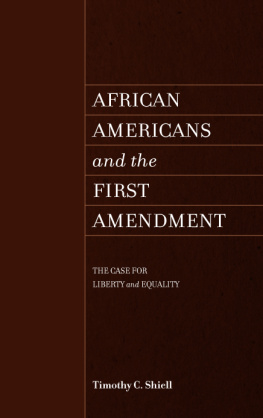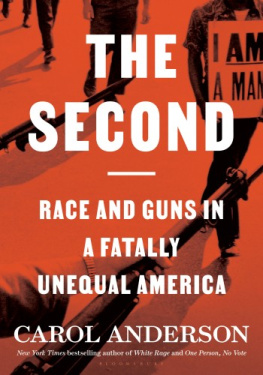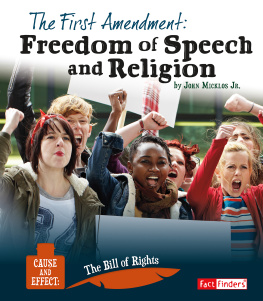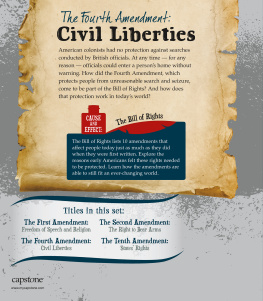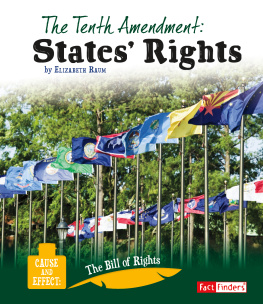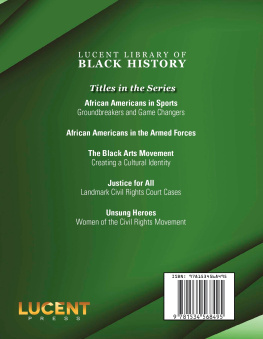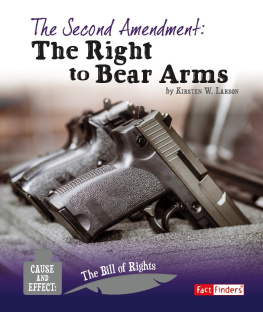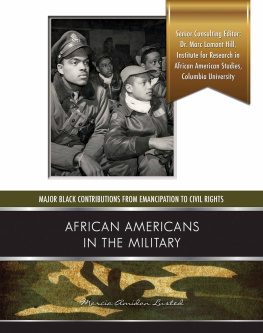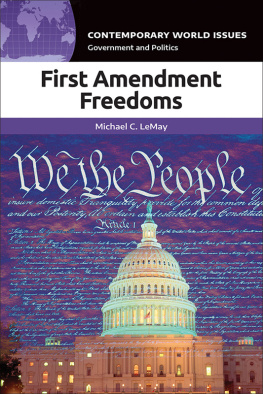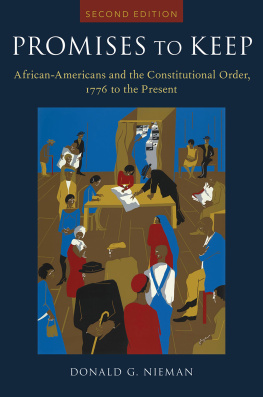AFRICAN AMERICANS
AND THE
FIRST AMENDMENT
SUNY S ERIES IN A FRICAN A MERICAN S TUDIES
JOHN R . HOWARD AND ROBERT C . SMITH , EDITORS
A FRICAN A MERICANS
and the F IRST A MENDMENT
The Case for Liberty and Equality
TIMOTHY C. SHIELL
Published by State University of New York Press, Albany
2019 State University of New York
All rights reserved
Printed in the United States of America
No part of this book may be used or reproduced in any manner whatsoever without written permission. No part of this book may be stored in a retrieval system or transmitted in any form or by any means including electronic, electrostatic, magnetic tape, mechanical, photocopying, recording, or otherwise without the prior permission in writing of the publisher.
For information, contact State University of New York Press, Albany, NY
www.sunypress.edu
Library of Congress Cataloging-in-Publication Data
Names: Shiell, Timothy C., author.
Title: African Americans and the First Amendment : the case for liberty and equality / Timothy C. Shiell.
Description: Albany : State University of New York Press, 2019. | Series: Suny series in African American studies | Includes bibliographical references and index.
Identifiers: LCCN 2018045644| ISBN 9781438475813 (hardcover : alk. paper) | ISBN 9781438475837 (e-book)
Subjects: LCSH: African AmericansCivil rights. | Freedom of speechUnited States.
Classification: LCC KF4757 .S525 2019 | DDC 342.7308/508996073dc23 LC record available at https://lccn.loc.gov/2018045644
10 9 8 7 6 5 4 3 2 1
This work is dedicated to all the people who exercised their freedom of speech, assembly, association, press, religion, and petition to promote racial equality, to those who are doing so, and to those who will do so in years to come.
CONTENTS
PREFACE
Courts in the United States have made bold statements about the significance of freedom of expression for more than 100 years. Consider three examples:
Freedom of speech and press have always been supposed to be the very cornerstone of Anglo-Saxon democratic institutions.
If there is any principle of the Constitution that more imperatively calls for attachment than any other, it is the principle of free thoughtnot free thought for those who agree with us but freedom for the thought that we hate.
Freedom of thought and speech [are] the matrix, the indispensable condition, of nearly every other form of freedom.
In the 1960s, Harvard University law professor Thomas Emerson expressed a scholarly consensus that free speech is not the only social good but is essential to achieving the others (such as public order, justice, equality, and moral progress). Therefore, these other values must be pursued by regulating action, not expression. Hudson quotes many other First Amendment experts to indicate a consensus on this conclusion, including Jack Greenberg, director-counsel of the NAACP Legal Defense and Educational Fund from 1961 to 1984; Robert ONeil, director of the Thomas Jefferson Center for the Protection of Free Expression; Robert Richards, founding director of the Pennsylvania Center for the First Amendment at Pennsylvania State University; and journalism professors Linda Lumsden and Margaret Blanchard.
Some have gone further to argue that disrupting, shutting down, or violently opposing offensive expression is justified.
This book argues that First Amendment values, particularly freedom of expression, have beenand continue to beessential allies in the struggle for racial equality and justice. Liberty and equality can and do conflict in some cases, but these values are not in fundamental conflict. This distinction has important implications. The misconception that they are in fundamental conflict has been detrimental to the cause of racial equality in many important ways. Rather than urge greater restrictions on expression, advocates of racial equality and justice should remain committed to robust free speech rights and exercise that right vigorously. The argument is laid out in four chapters.
demonstrates the role First Amendment values (not law)especially free speechplayed in racial progress from the colonial era to the 1930s. I use the phrase American apartheid to refer to this era, in which a pervasive system of legal, political, economic, and social inequality was imposed by whites on African Americans and was supported by restrictions on speech, press, assembly, petition, and religion. Likewise, the denial of equality supported the denial of liberty. Yet the defiant exercise of liberty (First Amendment values) against the status quo inequality played a crucial role in the racial progress that was achieved. The chapter focuses on African Americans but also addresses other groups to demonstrate the long reach of the oppression of equality and suppression of liberty. Some important milestones covered include the slave clauses in the US Constitution, the Cherokee Nation Cases, the abolitionist movement and Dred Scott decision, and the series of Supreme Court decisions from the 1870s to the 1890s deconstructing Reconstruction and civil rights laws. Even when slavery was outlawed, African Americans remained targets of organized terror and victims of systemic social, economic and political subordination, especially but not exclusively in the Jim Crow South. Inequality was buttressed by restrictions on liberty. There was extensive censorship of and mob violence directed at African Americans and other minorities, labor activists, political dissidents, and free thinkers. The strong First Amendment legal rights we know today did not begin to develop until after World War I persecution of dissenters and its concomitant condemnation of radical immigrants. The US Supreme Court finally used the First Amendment in 1931 to protect free speech ( Stromberg v. California ) and free press ( Near v. Minnesota ) from state suppression.
protected a black mans speech and the first time it struck down a Southern speech restriction. Herndons case is commonly recognized as an important First Amendment decision, but it was more than that. It was a critical step in the civil rights movement, a milestone in the debate over race-neutral versus race-conscious strategies, and a paradigmatic example of the use of mass politics and mass protest to advance liberty and equality. Herndons victory was the first time black dissent (free speech) and black legal equality were upheld together as the law of the land.
continues the argument through a study of the symbiotic relationship of First Amendment values and the civil rights movement from the Herndon decision to the 1970s. The vigorous assertion of and exercise of First Amendment values was an intentional and essential component of advances in civil rights; likewise, the movement to attain civil rights was integral to the expansion of First Amendment legal rights. Harry Kalven Jr. suggested in his 1965 book The Negro and the First Amendment , the African American struggle for equality won back First Amendment rights for all citizens in the 1960s that communists had lost for us in the 1950s. Liberty and equality were widely understood to be fundamental allies. Attention is given to the role of international criticism of American apartheid in the expansion of civil rights and to key organizations, especially the National Association for the Advancement of Colored People (NAACP). The final section addresses US Supreme Court Justice Thurgood Marshall, whose devotion to First Amendment values (especially freedom of expression) and racial equality is a paradigm of the view this book defends.

